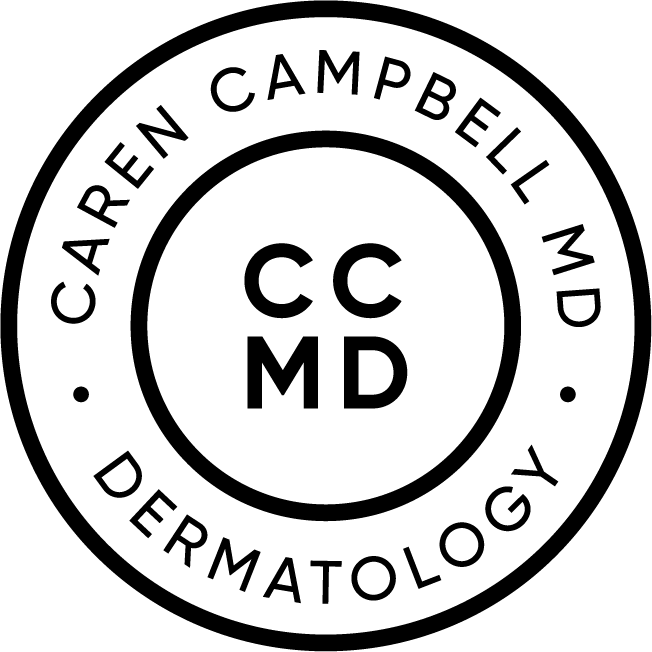Acne
The cause of acne is multifactorial: clogging of pores, hormonal influences, and inflammatory processes all play a role.
What treatment options are available for acne?
Treatment options work to address the causes of acne and include:
Topical retinoids (adapalene/tretinoin/tazarotene) are the mainstay of any good acne treatment plan.
Over-the-counter benzoyl peroxide wash. Dr. Campbell’s favorites include Neutrogena Clear Pore or Panoxyl to face/chest/back 1-2x/day. Warning, benzoyl peroxide will bleach fabrics.
Topical antibiotics like clindamycin lotion, solution or wipes. It is best to use clindamycin with a benzoyl peroxide wash given the acne causing bacteria, p. acnes, can become resistant to clindamycin when used in isolation.
Oral antibiotics have fallen out of favor as a long-term treatment option for acne given the risks of inflammatory bowel disease with prolonged use, but can help jump start a great topical treatment plan.
How do I use retinoids– they make me red, dry and scaly?
Most patients start with small pea sized amount to entire face 10 minutes after washing the face in the evening three times per week and titrate up as tolerated. Side effects include dryness and irritation, but your face will adjust to the medications slowly over time.
Avoiding application to a wet face and applying moisturizer on top of the thin layer of retinoid help ameliorate these unwanted side effects. Tretinoin and tazarotene are deactivated by sunlight, so it is best to use your retinoid at night.
Why is my acne treatment not working?
The best advice for patients with acne is to be patient and to stick with their treatment plan. Patience is key. Acne can unfortunately flare before improving during the initial period of a new treatment plan. Efficacy for any new acne regimen may take 6-8 weeks prior to seeing improvement.
Hormonal Acne
Acne that flares with periods and occurs in the "beard-area" aka where facial hair grows on men (jawline and chin).
What can be done for hormonal acne?
Adding spironolactone or oral contraceptive pills like Sprintec, Yaz or Loestrin can oftentimes benefit patients experiencing hormonal acne.
Topical anti-inflammatory agents like dapsone (Aczone) can help with larger, sore, more inflamed acne lesions and have been marketed specifically for female hormonal acne.
Other things to consider are spearmint tea and anti-inflammatory blue light treatments.
Acne and Family Planning
Can I stay on the same acne treatment plan if I become pregnant?
Acne during pregnancy, breastfeeding and conception requires modification to your treatment plan. It is important to consult with your OB/GYN prior to using any topical or systemic agents for acne, given many of them are contraindicated during pregnancy. Some potential acne treatments might include azelaic acid and topical clindamycin.
Isotretinoin
(aka Accutane)
I have heard so many scary things about Accutane, what is the story?
If your acne is scarring or not responding to an appropriate treatment plan after 3-6 months, Dr. Campbell may consider prescribing isotretinoin. Isotretinoin is very effective for acne, but it is not without side effects, therefore education about the medication is essential.
What are some of the potential side effects of isotretinoin?
Birth defects occur if you become pregnant while on this medication. For this reason, females must use two forms of birth control. Other side effects of the medication include (but are not limited to): dry skin, dry eyes and mouth, elevated liver enzymes, elevated triglyceride levels, hair loss, joint and muscle pain, changes in mood, headaches. Baseline blood work and routine laboratory monitoring must be done prior to starting the medication and continue during the treatment course.
How do I help prevent and treat some of the common side effects of isotretinoin?
Isotretinoin dehydrates the body so it is important to stay hydrated with plenty of non-caffeinated beverages and moisturize the skin frequently with products like Skinceuticals Triple Lipid, Cetaphil or Cerave Cream. Your lips will inevitably become dry and scaly so keeping them hydrated throughout the day with Vaseline, Aquaphor or Dr. Dan’s Cortibalm is essential. Nosebleeds can also occur. You can decrease the chance of nose bleeds by applying Vaseline or Aquaphor to the inside of the nose at night time and using vaporizer in the room at night to keep nasal passages moist. For dry eyes, over the counter rewetting drops can provide relief.
Isotretinoin can increase triglycerides, the fats in your blood. Maintain a healthy diet while on the medication, which includes fruits, vegetables, lean proteins, and whole grains and avoid foods high in saturated fats and fried foods. Drink plenty of water.
What should I expect if I take isotretinoin?
Prescriptions for isotretinoin are regulated by the government through a system called iPledge. Patients must register with iPledge, get routine labs and be seen monthly while on isotretinoin. A treatment course takes about 6 months.
The most important thing to know is you should not become pregnant. Other important things to note: you should not get anyone pregnant, share medication, donate blood, get any elective procedures or surgeries performed, including body piercing, tattoos, and waxing. Some antibiotics are contraindicated while on isotretinoin. If antibiotics are required for an infection, please speak with your healthcare provider.



